Workshop Basic Info
Organizer:
University of Aberdeen Business School
Workshop Chair:
Personal Bio:
Dr. Naser Makarem is an assistant professor in accounting at the University of Aberdeen, UK. He is the leader of MSc Accounting and Finance programme and Partnerships Programmes Director at Aberdeen Business School. Dr Makarem teaches several courses in the area of financial accounting both in the UK and at overseas partners in China and Qatar. He supervises PhD students and has research interests in the broad area of financial reporting and particularly earnings management. Dr. Makarem’s research mainly focuses on factors influencing corporate financial reporting. In particular, he studies how social, economic and political factors affect earnings management. He is also interested in changes in earnings management behaviour over time as well as the impact of regulatory environment and political and economic factors on such changes. He also studies how earnings manipulation is restricted by factors such as external audit and corporate governance..
Background
The UK's decision to leave the European Union in 2016, known as Brexit, has created a prolonged period of uncertainty, unlike previous events such as the September 11 attacks. Brexit's unique impact has led to a significant decline in UK investment, making it an ideal case study for analyzing the causal impact of policy uncertainty. While previous research has focused on Brexit's effects on economic indicators and stock market volatility, little attention has been given to its potential to establish causal evidence of policy uncertainty, particularly in the realm of accounting issues such as audit fees. Existing studies on economic policy uncertainty and audit fees have produced conflicting results and lack designs for causal inferences. This research aims to use Brexit as a unique shock to provide causal evidence of its impact on audit pricing, specifically due to induced economic policy uncertainty
Goal/Rationale:
Studying the impact of a Brexit on audit pricing contributes significantly to existing literature by expanding our understanding of Brexit's multifaceted impacts and examining its effects on auditing issues, particularly audit fees. It distinguishes itself from previous studies by utilizing Brexit-induced economic policy uncertainty (EPU) as a good shock and employing a DiD research design to establish a causal link between EPU and audit fees, thereby addressing the limitations of prior studies reliant on news-based uncertainty indices. Moreover, it adds depth to the conflicting research on EPU's role in audit fees by refining contradictory findings and providing new insights into the mechanisms through which EPU influences audit pricing. The study's focus on Brexit's consequences is valuable not only for economic stakeholders in the UK and EU but also for countries with economic ties to them. Framing Brexit as an exogenous uncertainty shock enhances the potential applicability of the study's results beyond its immediate context. Despite ongoing research on Brexit's economic and business consequences, addressing societal, policymaker, and market concerns about its unintended outcomes, such as its effect on audit fees, remains crucial.
Call for Papers
Scope and Information for Participants:
This workshop is a great opportunity for researchers focused on auditing, policy-making and related factors as naturally a key audience to contribute to discussions surrounding various themes. By exploring the intricate relationship between policy uncertainty, auditing practices, and events like Brexit on international relations, this workshop contributes to a deeper understanding of public policy and international relations in the contemporary global landscape. Delving into the impact of Brexit on the field of auditing helps reveal the potential effects of international policy changes on business practices and international cooperation, providing valuable insights for future public policy-making and international relations development. Prospective participants are encouraged to submit papers at the workshop, and several keywords are listed to share the potential themes with interested participants, while the topics are not limited to the provided keywords.
Keywords
- Brexit
- Economic Policy Uncertainty
- Audit Fees
- Policy-making
Topics
- Comparative Politics
- International Relations
- Political Theory
- Political Economy
- Political Philosophy
- Public Policy
- Political Theory
- Public Administration
- Domestic Policy
- Human Rights
Submission
All submitted papers should report original and unpublished work, experimental or theoretical, and are not under consideration for publications elsewhere. All papers should be no less than 4 pages in length and must strictly follow the format of the workshop template. All papers are subject to reviews and edits. Prospective authors are kindly invited to submit full text papers that includes title, abstract, introduction, tables/figures and references. Other styles of papers are not accepted. Please submit your papers in both .doc/.docx AND .pdf formats as attachments via email to [email protected] by the given deadline. It is unnecessary to submit an abstract in advance.
Publication
Accepted papers of the workshop will be published in Lecture Notes in Education Psychology and Public Media (Print ISSN 2753-7048), and will be submitted to Conference Proceedings Citation Index (CPCI), Crossref, CNKI, Portico, Google Scholar and other databases for indexing. The situation may be affected by factors among databases like processing time, workflow, policy, etc
* The papers will be exported to production and publication on a regular basis. Early-registered papers are expected to be published online earlier.
Highlights:
The workshop titled "Brexit and Audit Pricing," held on July 31, 2024, at the Sir Duncan Rice Library, University of Aberdeen, Scotland, was an exceptional success, attracting considerable attention from a diverse group of professionals across multiple fields. The event's wide-ranging appeal underscored its significance in addressing current issues at the intersection of economic policy and audit practices.
A key highlight of the workshop was the presentation of a research paper, also titled "Brexit and Audit Pricing." This paper, which is currently under review for publication in the Accounting Review—an esteemed journal recognized as the most prestigious by the Chartered Association of Business Schools—provided profound insights into the impact of economic policy uncertainty on audit fees in the context of Brexit. The paper explored how the uncertainty surrounding Brexit has influenced audit pricing, shedding light on the broader implications for the financial and regulatory environment in the UK and beyond.
The presentation, delivered by an assistant professor of accounting at the University of Aberdeen, offered a thorough review of existing literature and recent research findings. The session also examined potential policy implications, presenting a well-rounded and in-depth analysis of the topic. The workshop generated substantial engagement among attendees, sparking lively discussions that continued well beyond the formal session. This dynamic exchange of ideas significantly contributed to the event’s success, ensuring it was an intellectually enriching experience for all who participated.
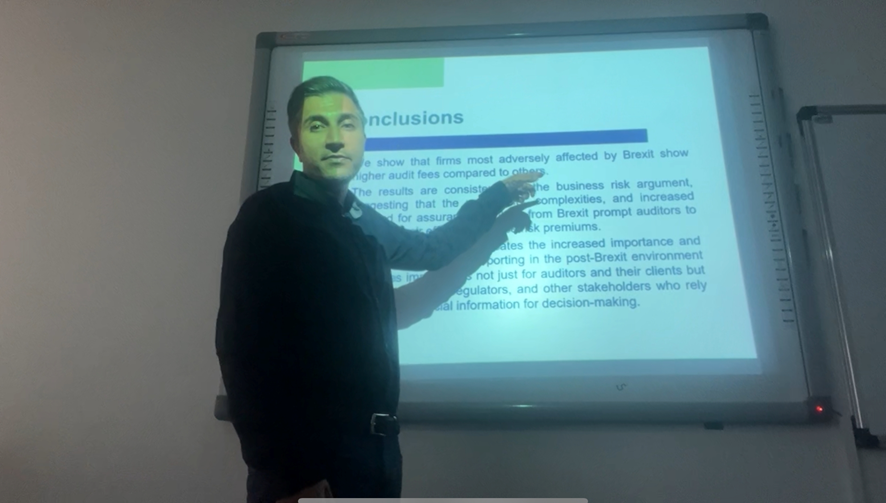
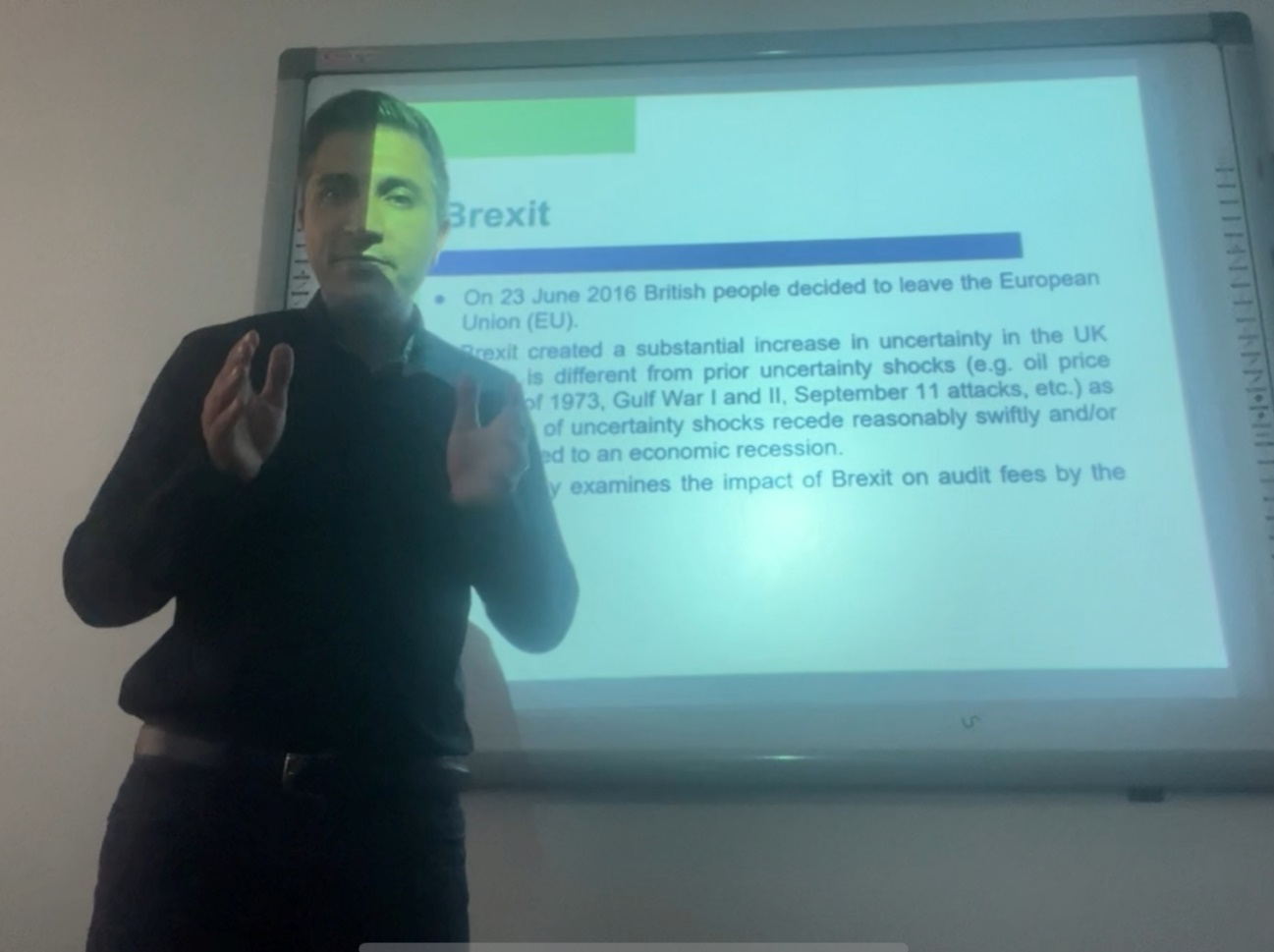
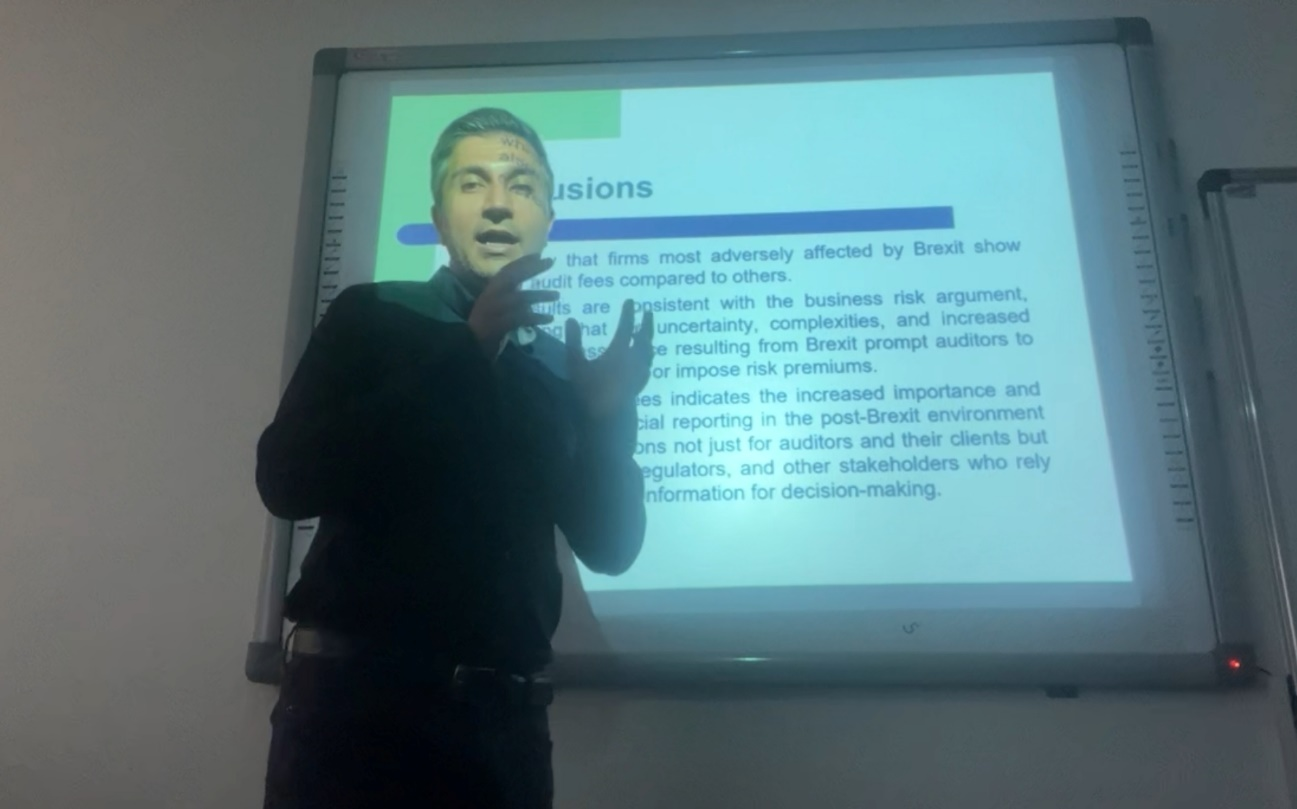
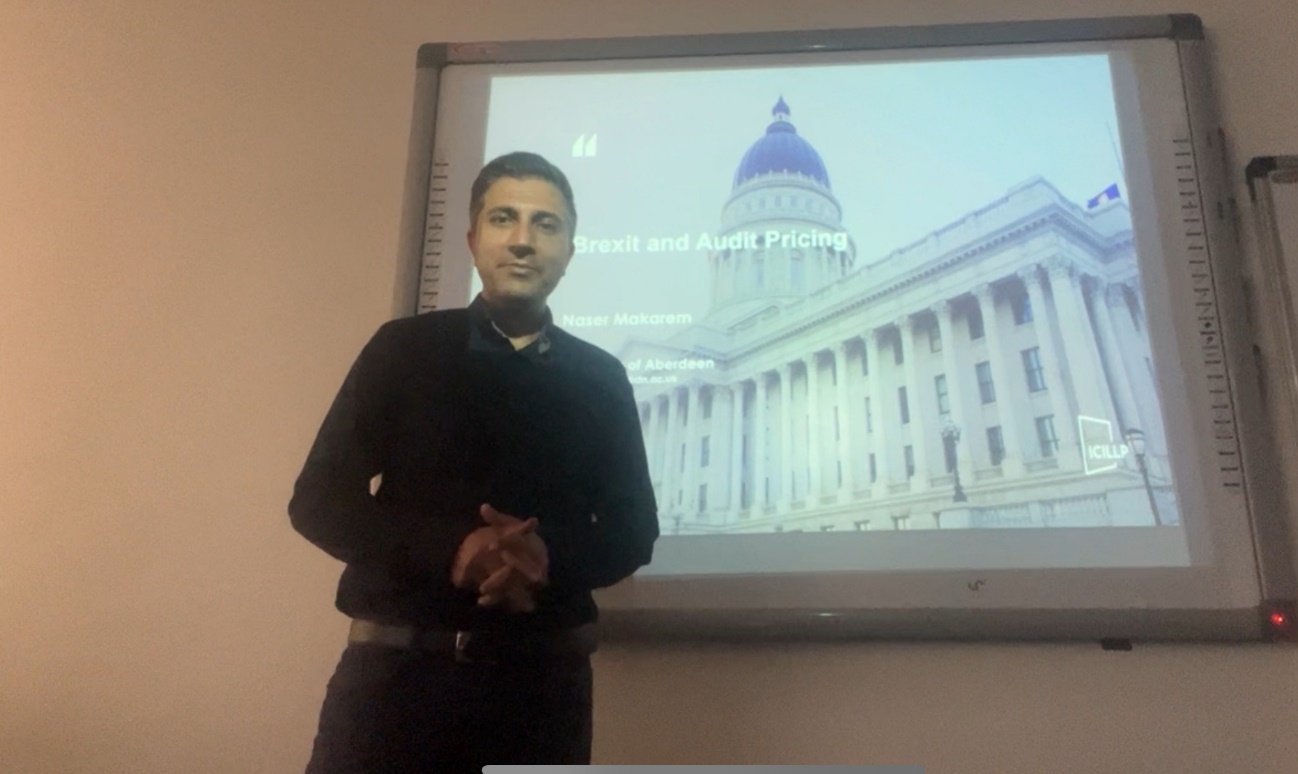
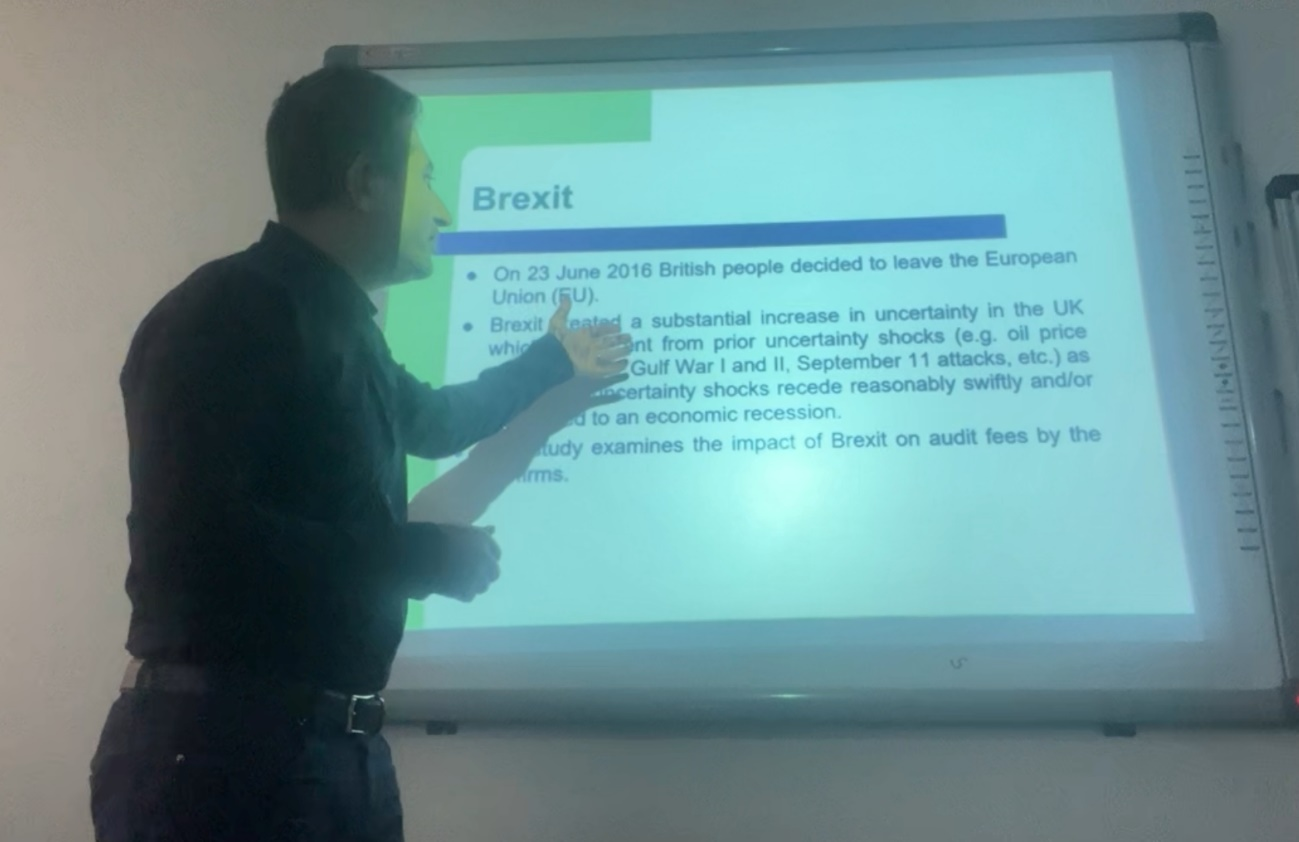
Access to Workshop: ICILLP 2024 Workshop -- Aberdeen - YouTube
Ways to Participate
To break the barriers of time and space and to provide seamless communication opportunities for worldwide scholars, both online and offline participation methods are supported for the workshop. Participants are encouraged to bring their own insights, experiences, and examples to share with the group through either presenting a poster online or attending in person.
Poster Session
The poster session will provide an opportunity for researchers to present their work in a visual and interactive way, allowing for more engagement and discussion with other attendees. Authors of qualified papers will be invited to present their works with digital posters. We believe that this online poster session will still be a great platform for participants to share, discuss, and cooperate. All accepted authors will receive an invitation email to present at the official workshop website. Please note that all poster presenters must submit the poster before July 24, 2024. Detailed information on your presentation date and time will be confirmed closer to the meeting. If you have any questions, please email [email protected].
Poster Presentation Guidelines
- Poster presentations must be prepared using the template provided:
*Poster layout template for poster presentation (download)*Poster layout background (download)
- Posters should generally be in A1 size (width: 594mm x height: 841mm) and include the
followings:
Title, author and co-author names, and the affiliation(s) information.
Body parts, including "Abstract", "Introduction", "Methods", "Results", "Discussion" and "Conclusions".
- Presenters are suggested to set the font size properly and avoid placing anything at the margin part of the poster as it will be difficult to view.
- Posters should be well illustrated. All the pictures used should be high quality and with high resolution.
- All the posters will be displayed online on the official website. Each poster will have both a small thumbnail and a full-size version.
- Posters will be displayed during the online session. After the presentation is over, the full-size version of all posters will become invisible. But thumbnails still can be seen on the website.
(You can refer to the instructions for more detailed information. Additional presentation guidelines may be announced by workshop committees.)
Attendance Onsite
The workshop welcomes participants to attend on-site and share the innovative experiences and researches with the group. Therefore, we provide some general information about the visa application. If you want to attend the workshop on-site, please email the workshop
committee:[email protected]
Visa
In order to ensure the information is correct and up to date, there may be changes which we are not aware of. And different countries have different rules for the visa application. It is always a good idea to check the latest regulations in your country. This page just gave some general information of the visa application.
UK Visa Information
What you need to do
- Check if what you plan to do in the UK is allowed as a Standard Visitor.
- Check you meet the eligibility requirements.
- Check if you need to apply for a visa to visit the UK.
- Apply for a Standard Visitor visa online - if you need one.
Check you meet the eligibility requirements
You must have a passport or travel document to enter the UK. It should be valid for the whole of your stay
You must be able to show that:
- you'll leave the UK at the end of your visit
- you're able to support yourself and your dependants during your trip (or have funding from someone else to support you)
- you're able to pay for your return or onward journey (or have funding from someone else to pay for the journey)
- you'll not live in the UK for extended periods through frequent or successive visits, or make the UK your main home
Check if you need a visa to visit the UK
Depending on your nationality, you'll either:
- have to apply for a Standard Visitor visa before you travel to the UK
- be able to visit the UK for up to 6 months without needing a visa
You can check if you need a visa before you apply.
If you do not need a visa, you must still meet the Standard Visitor eligibility requirements to visit the UK. You may be asked questions at the UK border about your eligibility and the activities you plan to do.












